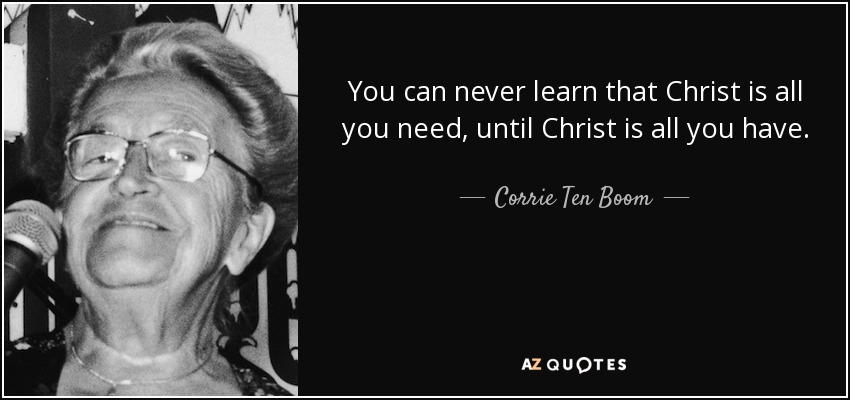Click here to return to Blog Post Intro
John Maxwell reflected, “Truth be told, everything I know about leadership has come from Scripture.” He then provides several good leadership examples from the Old Testament.
Elijah: God Loves You on Your Bad Days
Elijah was a giant of the faith, whom God used to demonstrate His power against 450 prophets of Baal and 400 prophets of Asherah on Mount Carmel. Not long after that, Jezebel vowed to kill Elijah, so he ran.
Since he fell from such a height, the fall must have felt twice as great for Elijah; and he was greatly discouraged. But then Elijah’s expression changes and he recognizes, “But even on our worst days, God still loves us.” Elijah shows us that when we feel desperate and have nothing, look to God. He will care for us.
We want God to do the spectacular every time, but sometimes He would rather whisper to us.
Other people look at a leader’s failure and think, “They’ve blown it. They are disqualified from ever leading again.” Fortunately, that’s not how God thinks. With failures, God wants His leaders to be restored to Him and get back into the game.
Elisha: Give Your Best Wherever God Puts You
Elisha followed Elijah as God’s prophet. Whatever task God gave him, Elisha did with all his heart and all his ability. He demonstrated that when we work with excellence and the right motives, God is pleased.
We should recognize that whatever we’re doing for God is important to God. As Richard Foster put it, “The grace of humility is worked into our lives through the discipline of service…nothing disciplines the inordinate desires of the flesh like serving in hiddenness. The flesh whines against service but it screams against hidden service. It strains and pulls for honor and recognition.”
Job: God Sees the Big Picture
Remember the story of Job. As he was losing everything—his family, his home, his loved ones, his health—his friends were trying to determine where he went wrong. As a friend to others, our takeaway should be that sometimes the best thing we can do when friends are suffering is simply sit on the ash heap and weep with them.
We see that Job was bigger and better on the inside than on the outside. He was able to stay true to God and to himself, no matter what was thrown at him: the destruction of his world, the loss of his possessions, the death of his children, torture at the hands of the Enemy, doubt on the part of his wife, and friends who preached at him instead of empathizing with him.
Job says, “Being bigger on the inside than the outside means…
- Your character is greater than your reputation.”
- Your attitude is better than your circumstances.”
- Your faith in God is stronger than your vision.”
What can we learn from Job?
- Good leaders don’t allow their emotions to dictate their decisions. Like all good leaders, Job did what was right, and then hoped to feel good about it later. He didn’t do what felt good and hope it turned out right.
- Good leaders know outside reputation should never be greater than inside character.
- Good leaders realize that victory does not come quickly or easily.
Jacob: Let God Have Control of Your Life
Jacob continually worked to be in control of his life and his circumstances. Isn’t that true for most of us? We don’t want to let go of control and let God have it.
Jacob probably would have reflected something like this, “I kept trying to make things happen. But I didn’t understand God or how He worked.”
Too often we are like a horse who allows his master to put a bit in his mouth, but then he fights against it. What we don’t seem to understand is that if we allow God to have complete control of the reins in our life. He will stay with us continually, and He will guide us away from danger, see that we are fed, and lead us back home.
God knows that when we run out of options, we are finally ready to turn to Him. Jacob learned that brokenness precedes a breakthrough. You must lose yourself to find yourself. Jacob thought, “My goal in life is to become wealthy and have a large family, but God’s goal for me was so much bigger than my own. He wanted me to father a nation!”
We need to let go of our agenda, and hand over our goals to God. Give Him control. We cannot be what God intends us to be and at the same time hold on to who we think we should be.
Deborah: God Specializes in the Unexpected
Deborah was an unusual and exceptional leader at a time when women normally were unable to rise up. But God raised her up as one of His judges, showing that He enjoys using people others might discount or dismiss.
Warren W. Wiersbe said, “If you can explain what God is doing in your ministry, then God is really not in it.” God wants us to wait and depend on Him. He delights in showing His creativity.
Fortunately, Deborah was willing to stand out when others didn’t expect it and speak out when God expected it. While there may not always be safety in standing up and speaking out for God, there is always security in God.
Deborah likely would advise, “If you are a leader, you must step out when your people are depending on you. Your courage is their courage. Your obedience is their obedience. Your victory is their victory. Don’t let it slip away.”
Pastor Jack Hayford observed, “Nothing is more limiting than the self-imposed boundaries we clamp around our own lives when we require God to fit into our expectations.” When God asks us to do something for Him as a leader, it’s a privilege. It’s an invitation, not an obligation. Will we accept it? If we allow fear to stop us, then the blessing will go to someone else.
Isaiah: God Has a Reason for Your Encounter with Him
Isaiah has been called the prince of prophets and the Shakespeare of the Bible.
Isaiah encountered God in unique ways. When we encounter God and get a sense of His holiness and purity and power and glory, we cannot help but be humbled. An encounter with God is a prerequisite for His sending us out to be a messenger for Him. We must be changed before we can encourage others to change.
God loves us, even as we are, but He does not want to leave us where we are. He wants to help us change for the better.
God has an assignment for us. He won’t force us to take it. He will offer it to us, and we must choose it freely. We must volunteer. But if we say yes, it will be the best part of life for us. As a leader, seek God before any undertaking. Don’t try to touch the people until you’ve received a touch from God.
Jonah: God Always Gives Us a Second Chance
Consider the prophet Jonah, who not only disobeyed God but ran in the opposite direction until he was swallowed by a giant fish for three days. Then, we see twelve of the most amazing words contained in all of Scripture, “Then the word of The Lord came to Jonah a second time.” There isn’t a human being who’s ever lived who didn’t need a do-over.
Fortunately, God chooses to use imperfect people. When we get a second chance like Jonah, we need to make it count! If God was able to use Jonah with his disobedience, bitterness, and bad attitude, just think what He might be able to do with us.
As leaders, we must never forget that every decision we make affects other people. The greater the influence and higher the position, the larger the number of people affected. The decisions of leaders have a compounding effect on others—either positive or negative.
Good leaders do the right things for the right reasons with the right heart. For that reason, we must continually examine our hearts.
Joshua: God is Greater than Your greatest Challenges
Joshua was Moses’ appointed successor and led the people of Israel into the Promised Land. Joshua would say, “One plus God is always a majority. Do not allow past failures to keep you from future successes. God is greater than that.”
Let God encourage you with courage. Scripture records that God encouraged the people eleven times in eleven chapters. Why so often? Because one word of encouragement was not sufficient for forty years of failure.
Emmet Fox said, “It is the Law that any difficulties that can come to you at any time, no matter what they are, must be exactly what you need most at that moment, to enable you to take the next step forward by overcoming them. The only real misfortune, the only real tragedy, comes when we suffer without learning the lesson.”
We want God to fix everything in our lives for us. He would rather come alongside and work with us. For that reason, the challenges in life will never stop. It’s God’s way of keeping us close to Him.
Daniel: Have a Purpose Bigger than You
Daniel sensed that God had a bigger purpose and he stood up for God, refusing to abide by the commandments of kings. That was especially true when he and his friends chose not to eat the king’s choice food. Daniel’s purpose gave him:
- Clarity. Danish philosopher Soren Kierkegaard remarked, “What I really lack is to be clear in my mind what I am to do, what I am to know… The thing to understand myself, to see what God really wishes me to do…to find the idea for which I can live and die.”
- Conviction
- Confidence. There are two kinds of confidence for people of faith:
- Self-Confidence, which comes from knowing and trusting yourself
- God-Confidence, which comes from knowing and trusting God
When you allow a purpose that is bigger than you are, it makes you stand out from the crowd. Be yourself and remain true to God—when the temptation is to go with the crowd, when your integrity is put to the test, when the rest of the world begs you to be someone else. Be true to yourself and true to God—and He will be glorified.
Daniel’s life showed that greatness didn’t come from doing all he could do. Instead, it came from allowing God to do all He could through Daniel. The longer you walk with God and strive to live according to His greater purpose, the more courage He will give to fulfill His will. Courage is like a muscle: it is strengthened by use.
Daniel’s life is a reminder that to lead for God, a person need not be born into an important family, possess riches, or have a title or position. Daniel started his career as a slave. And he died a slave. But what he did in his lifetime made an impact.
The gap between making a difference and making no difference at all isn’t talent, opportunity, or privilege. It’s purpose. People who fail to make a difference in the lives of others lack purpose.
As a leader, your why needs to be bigger than you are. If you are bigger than your why, you might have a successful career, but you will have little more. If your why is bigger than you are, you have a calling. And your calling makes it possible for you to always do the right thing, not merely the easy thing.
It’s said there are two great days in every person’s life: the day you are born…and the day you discover your why.
Brady’s Reflections
Considering leadership lessons from our Old Testament Heroes is always fun. Last Sunday, Jennifer and I completed our commitment to teach a 4th/5th grade Sunday School class at our church. Every other year, we study the Heroes of our faith, and this year, we spent a quarter studying Old Testament Heroes. Maxwell’s book provided some good reminders about that study.

As I consider National Senior Citizens Day, I’m pleased to say that I have positive influences from my parents (pictured far right below), my in-laws (pictured far left below), and my grandparents.

Over the years, I’ve blogged about each of them:
- Dad: “Grateful to be Influenced by an Anchor Man” on May 5, 2017
- Mom: “Honoring a G.R.E.A.T. Mother” on May 14, 2017
- Dad, Grandfather, and Father-in-Law: “Happy Parents’ Day 2014 to Paw Paw, Pappy, & Pop!” on July 27, 2014
- Grandfather (on the day of his passing): “Leaving a Legacy: A Tribute to ‘Paw Paw’ (Allen Pyle)” on July 29, 2015
- Grandmother: “Mano’s ABC’s of Perseverance” on May 22, 2016
May these lessons from the Giants of our faith—as well as my tributes to some of those who’ve influenced me—serve you well, as you shoot for the stars on this Senior Citizens Day!



